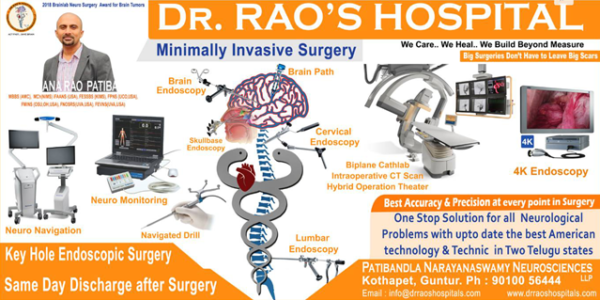The advancements in the best Brain tumor surgery
Discover the advancements in brain surgery made possible by cutting-edge technologies at Dr. Rao’s Hospital, the best neurosurgery hospital in India. Dr. Rao, the best neurosurgeon in India, utilizes innovative techniques to provide exceptional care and improve patient outcomes.
In neurosurgery, technological advancements have revolutionized brain surgeries, leading to improved outcomes and enhanced patient care. At Dr. Rao’s Hospital, renowned as the best neurosurgery hospital in India, Dr. Rao, the best neurosurgeon in India, spearheads the utilization of cutting-edge technologies to deliver exceptional neurosurgical care.
The Evolving Landscape of Brain Surgery:
Brain surgery is a complex and delicate procedure that requires precision, skill, and advanced techniques. Over the years, neurosurgical innovations have transformed the field, enabling surgeons to approach brain surgeries with greater accuracy, minimal invasiveness, and improved patient safety. These innovations have revolutionized how brain tumors are removed, vascular abnormalities are treated, and neurological conditions are managed.
Dr. Rao: Pioneering Neurosurgeon in India:
Dr. Rao is an eminent neurosurgeon who stands at the forefront of neurosurgical advancements in India. With a wealth of experience and expertise, Dr. Rao has earned a reputation as the best neurosurgeon in India. He continually pushes the boundaries of neurosurgery, embracing the latest technologies and techniques to deliver the highest standard of care to his patients.
Cutting-Edge Technologies in Brain Surgery:
Dr. Rao’s Hospital is equipped with state-of-the-art technologies that have revolutionized the field of neurosurgery. These innovative tools and techniques enhance surgical precision, minimize invasiveness, and improve patient outcomes. Let’s explore some of the cutting-edge technologies utilized at Dr. Rao’s Hospital:
Neuro-navigation Systems:
These computer-assisted systems integrate preoperative imaging data with real-time intraoperative images, enabling surgeons to navigate the brain’s intricate anatomy precisely. They help guide surgeons during surgery, ensuring optimal outcomes while minimizing damage to healthy brain tissue.
Minimally Invasive Techniques:
Minimally invasive approaches, such as keyhole craniotomies and endoscopic procedures, involve smaller incisions, reduced tissue disruption, and faster recovery times. These techniques offer significant benefits, including shorter hospital stays, decreased postoperative pain, and a minimized risk of complications.
Intraoperative Imaging:
Advanced imaging technologies, such as intraoperative MRI (fMRI) and intraoperative CT (iCT), provide real-time visualization of the brain during surgery. This allows surgeons to assess the procedure’s progress and make immediate adjustments, improving surgical precision.
Stereotactic Radiosurgery:
Stereotactic radiosurgery delivers high-dose radiation precisely to the target area within the brain without requiring surgical incisions. It treats brain tumors, arteriovenous malformations (AVMs), and other neurological conditions, offering a non-invasive alternative to traditional surgery.
Neurostimulation:
Deep brain stimulation (DBS) and transcranial magnetic stimulation (TMS) are neuromodulation techniques used to treat neurological conditions such as Parkinson’s, epilepsy, and depression. These procedures involve the implantation or application of devices that deliver electrical or magnetic stimulation to specific brain areas, regulating abnormal neural activity.
Robotics-Assisted Surgery:
Robotics-assisted neurosurgery combines the precision of robotic systems with the surgeon’s skills. Robotic assistance provides enhanced dexterity, stability, and range of motion, enabling surgeons to perform complex procedures with improved accuracy and efficiency.
Advanced Imaging Techniques:
High-resolution MRI and diffusion tensor imaging (DTI) allow for detailed visualization of brain structures and pathways. These advanced imaging techniques aid in surgical planning, allowing surgeons to navigate critical areas and avoid damage to vital structures during brain surgery.
Intraoperative Monitoring:
Intraoperative monitoring techniques, such as electroencephalography (EEG), motor evoked potentials (MEPs), and somatosensory evoked potentials (SSEPs), assess brain function in real-time during surgery. This helps surgeons preserve vital functions, monitor neural activity, and minimize the risk of complications.
These cutting-edge technologies have significantly advanced the field of neurosurgery, improving patient outcomes, reducing risks, and expanding the possibilities for treating complex brain conditions. Dr. Rao and his team at Dr. Rao’s Hospital stay at the forefront of these innovations, incorporating them into their practice to provide the best possible care for their patients.
The Best Neurosurgery Hospital in India: Dr. Rao’s Hospital:
Dr. Rao’s Hospital is a beacon of excellence in neurosurgery in India. The hospital’s commitment to providing the highest level of care is reflected in its state-of-the-art infrastructure, advanced technologies, and a team of highly skilled healthcare professionals. Dr. Rao’s expertise, combined with the cutting-edge resources available at the hospital, ensures that patients receive world-class neurosurgical care.
Hashtags: #NeurosurgicalInnovations #CuttingEdgeTechnologies #BrainSurgery #BestNeurosurgeon #DrRao #NeurosurgeryHospital #DrRaosHospital

